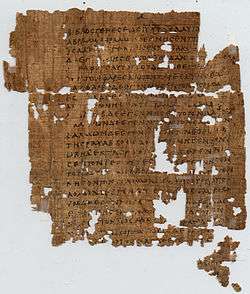Matthew 24
| Matthew 24 | |
|---|---|
 Matthew 1:1-9,12 on the recto side of Papyrus 1, written about AD 250. | |
| Book | Gospel of Matthew |
| Bible part | New Testament |
| Order in the Bible part | 1 |
| Category | Gospel |
| Gospel of Matthew |
|---|
|
Chapters |
Matthew 24 is the twenty-fourth chapter of the Gospel of Matthew in the New Testament of the Christian Bible. It records the Olivet Discourse spoken by Jesus Christ and his prediction of the destruction of the Temple in Jerusalem.[1] The book containing this chapter is anonymous, but early Christian tradition uniformly affirmed that Matthew the Apostle composed this Gospel.[2]
Text
- The original text is written in Koine Greek or Hebrew/Aramaic.
- Some most ancient manuscripts containing this chapter are:
- Codex Vaticanus (AD 325-350)
- Codex Sinaiticus (330-360)
- Codex Bezae (c. 400)
- Codex Washingtonianus (c. 400)
- Codex Alexandrinus (c. 400-440)
- Codex Ephraemi Rescriptus (c. 450)
- Codex Purpureus Rossanensis (6th century)
- Codex Sinopensis (6th century; extant: verses 3-12)
- Papyrus 83 (6th century; extant: verses 1, 6)
- This chapter is divided into 51 verses.
Structure
The New King James Version organises this chapter as follows (with cross references to passages in the other gospels):
- Matthew 24:1-2 = Jesus Predicts the Destruction of the Temple (Mark 13:1-2; Luke 21:5-6)
- Matthew 24:3-14 = The Signs of the Times and the End of the Age (Mark 13:3-13; Luke 21:7-19)
- Matthew 24:15-28 = The Great Tribulation (Mark 13:14-23; Luke 21:20-24)
- Matthew 24:36-31 = The Coming of the Son of Man (Mark 13:24-27,32; Luke 21:25-28)
- Matthew 24:32-43 = The Parable of the Fig Tree (Mark 13:28-31; Luke 21:29-33)
- Matthew 24:37-44 = No One Knows the Day or Hour (Luke 17:26-30,34-36)
- Matthew 24:45-51 = The Faithful Servant and the Evil Servant (Luke 12:41-48)
Cross references
Jesus predicts the destruction of the Temple
In the preceding chapters, Jesus has been teaching in the Temple and debating with the Pharisees, Herodians and Sadducees. Jesus and his disciples leave the Temple (Matthew 24:1), or the temple grounds in the New Living Translation,[3] never to return.[4] Jesus predicts that "not one stone shall be left here upon another". The prediction follows the sentiments expressed by Jesus in Matthew 23:37-38:
- O Jerusalem, Jerusalem ... See! Your house is left to you desolate.
Methodist founder John Wesley says that the prediction was "most punctually fulfilled", in that the majority of the temple buildings were burned and then dug up on the orders of the invading Roman general Titus in 70 AD.[5]
Mount of Olives
Jesus and his disciples proceed to the Mount of Olives, where a "private" conversation takes place regarding "the end of the age". Jesus' words here are referred to at the "Little Apocalypse" or "Olivet Discourse". Jesus appears to have led ahead of his disciples (Matthew 24:3), who come to him to enquire about the timing and signification of his parousia (Greek: παρουσιας). Mark 13:30 states that only Peter, James, John and Andrew came to speak with him.
Verse 15
- Therefore when you see the ‘abomination of desolation,’ spoken of by Daniel the prophet, standing in the holy place” (whoever reads, let him understand)[6]
Citation from Daniel 11:31; Daniel 12:11
Verse 35
- Heaven and earth shall pass away, but my words shall not pass away.[7]
Jesus' words refer to an Old Testament saying recorded in Isaiah 51:6:
- For the heavens will vanish away like smoke,
- The earth will grow old like a garment,
- And those who dwell in it will die in like manner;
- But My salvation will be forever,
- And My righteousness will not be abolished.[8]
See also
- Abomination of desolation
- Noah
- Noah's Ark
- Noah's Flood
- Olivet Discourse
- Other related Bible parts: Genesis 6, Genesis 7, Isaiah 51, Jeremiah 15, Daniel 11, Daniel 12, Matthew 25, Mark 13, Luke 12, Luke 17, Luke 21, 2 Peter 3
References
- ↑ Halley, Henry H. Halley's Bible Handbook: an Abbreviated Bible Commentary. 23rd edition, Zondervan Publishing House. 1962.
- ↑ Holman Illustrated Bible Handbook. Holman Bible Publishers, Nashville, Tennessee. 2012.
- ↑ New Living Translation
- ↑ Gill's Exposition of the Entire Bible on Matthew 24, accessed 19 February 2017
- ↑ Wesley's Notes on the Bible on Matthew 24, accessed 19 February 2017
- ↑ Matthew 24:15
- ↑ Matthew 24:35
- ↑ Isaiah 51:6
External links
| Preceded by Matthew 23 |
Chapters of the Bible Gospel of Matthew |
Succeeded by Matthew 25 |